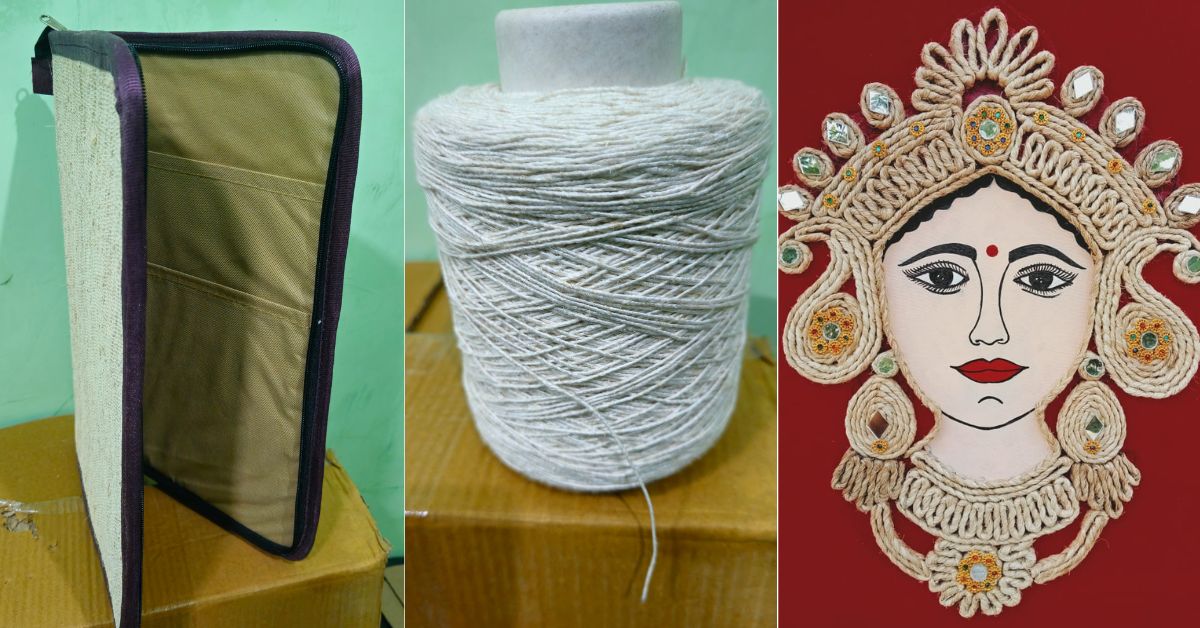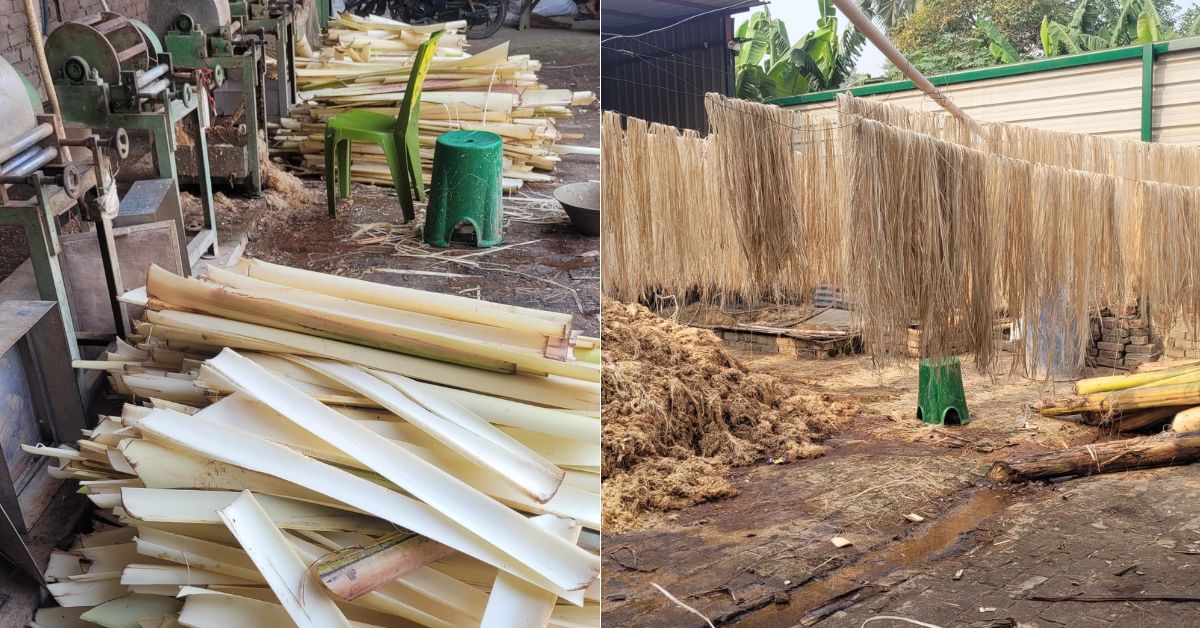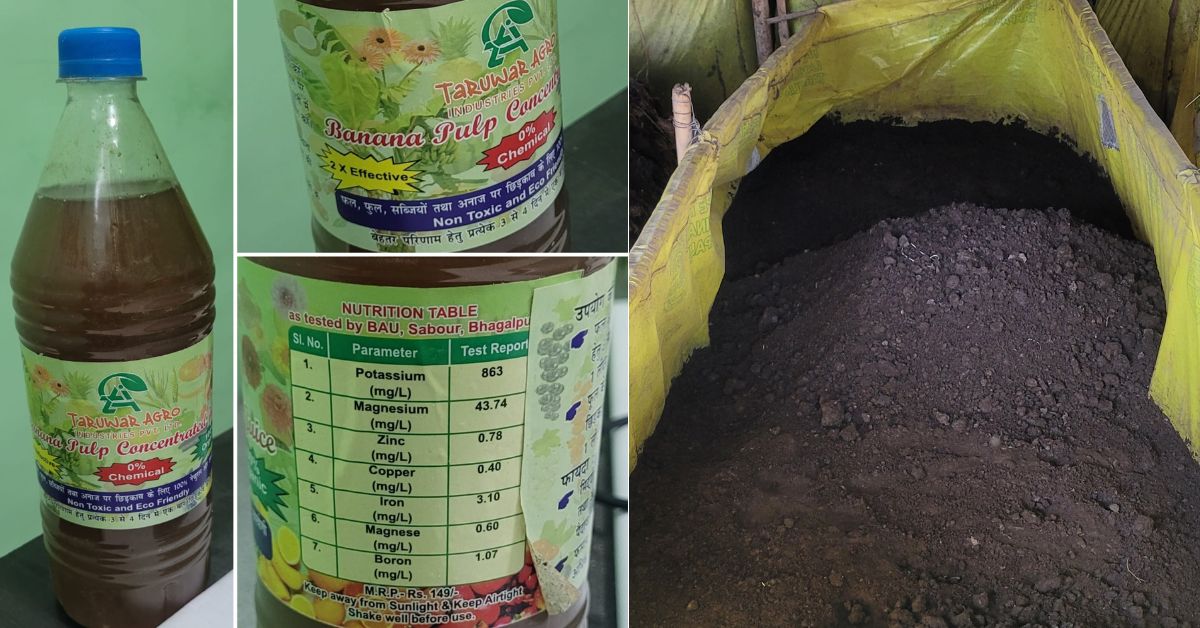Born into a farming family, Jagat Kalyan spent his childhood playing in the lush green fields of Hajipur, Bihar. He saw his family toil day and night to cultivate banana trees, but as soon as they harvested the fruit, the tree was axed down.
“It takes about nine months to grow bananas, and once the fruits are harvested, farmers need to chop down the tree as it produces fruits only once in its life cycle. I would see piles of banana trees dumped as waste in a corner of the field. Clearing the field also becomes a headache for farmers,” he says.
Data reveals that India leads the world in banana production with an annual output of about 14.2 million tonnes. After harvesting, almost 60 percent of banana biomass is left as waste!

Jagat did not have a solution to this issue until 2021 when he recognised this inefficiency in the agricultural process and decided to turn waste into wealth.
Through his zero-waste startup, Taruwar Agro, he utilises banana tree waste by converting it into banana fibre, which eventually serves as a raw material for various products — such as handicrafts, yarns, sanitary pads, and banana leather. By turning this waste into wealth, he has established a multi-lakh venture.
From college friends to co-founders
After completing his engineering and MBA, Jagat secured a job at a startup that focused on climate change and the environment. After working for nearly a year, he received various job offers from companies in Tanzania and Dubai. Instead of accepting these opportunities, Jagat aspired to run his own sustainable company in his native state of Bihar.
“The job was very demanding and we were required to work for 10 to 12 hours. I would often discuss with my college friends Satyam Kumar and Nitish Verma about quitting jobs to build something meaningful of our own,” he says.
Soon after, Jagat and his college friends started researching various issues that needed their attention. “Through our work, we wanted to put Bihar on the world map. That’s when it hit us that since Hajipur is known for its banana production, why don’t we focus on banana waste — an issue that all of us grew up seeing on our fields,” he adds.

To shape their dreams into reality, the trio quit their jobs and launched Taruwar Agro in 2021.
Their innovative approach focuses on converting banana waste into valuable products, contributing to environmental sustainability and creating economic opportunities for local communities.
The startup sources banana waste from at least 30 local farmers. “Depending on the size of the tree, we pay Rs 5 and Rs 25 per tree. Now, they are not just earning by selling fruit but also tree waste. Sometimes, many farmers do not accept money, as this process benefits them in clearing fields. This saves them labour costs of Rs 1,000,” says Jagat.
Leaving no waste behind
After extracting fibre from banana tree waste, the startup makes a wide range of products from banana fibre folders, yoga mats, baskets, paintings, cushion covers, coasters, and more. While doing so, it maintains a zero-waste approach in all its processes.
It utilises the leftover pulp from the fibre extraction and processes it into high-quality vermicompost. Furthermore, Taruwar extracts banana liquid from the pulp, which serves as a natural fertiliser rich in micronutrients like potassium and iron. “So everything in the process is turned into something valuable,” he points out.
The startup’s commitment to sustainability and social impact has garnered significant traction, with an annual turnover of Rs 50 lakh in the previous financial year. Every month, the startup utilises up to 600 kg of banana fibres from waste. Through offline and online marketing, it has established its customer base in Kerala, Gujarat, Delhi, Uttar Pradesh, West Bengal, Punjab, Tamil Nadu, and Madhya Pradesh.

Satyam, who looks after marketing and sales of the company, says, “We have been able to develop a good market base in India and now we aspire to enter into exports. By the end of this year, we will start exporting to other countries. A lot of companies are working on agriculture residues to make products, but our zero-waste approach helps us stand out in the market.”
Jagat, Satyam, and Nitish are not only entrepreneurs but also champions of sustainable innovation, paving the way for a greener future and a more inclusive economy. Their initiative showcases the potential to create positive change by reimagining waste as a valuable resource and contributing to the circular economy.
Through their dedication and vision, Taruwar demonstrates that small actions can lead to significant impacts, inspiring others to embrace sustainability and community empowerment in their entrepreneurial endeavours.
Looking back at his switch from the corporate world to a purpose-driven journey, Jagat says, “My family was hesitant when I decided to quit my job. After you invest your time and efforts in pursuing higher education in engineering and an MBA, anyone can expect you to settle for a high-paying job. But after the initial doubts, they understood where my true calling was and extended their support.”
“Today, I am glad that banana waste in a radius of 10 kilometres from our factory is being used as raw materials for useful products. With this, farmers are also getting extra monetary benefits. Banana waste is no longer a headache for them now,” he smiles.
Edited by Arunava Banerjee; All photos: Jagat Kalyan.
No comments:
Post a Comment